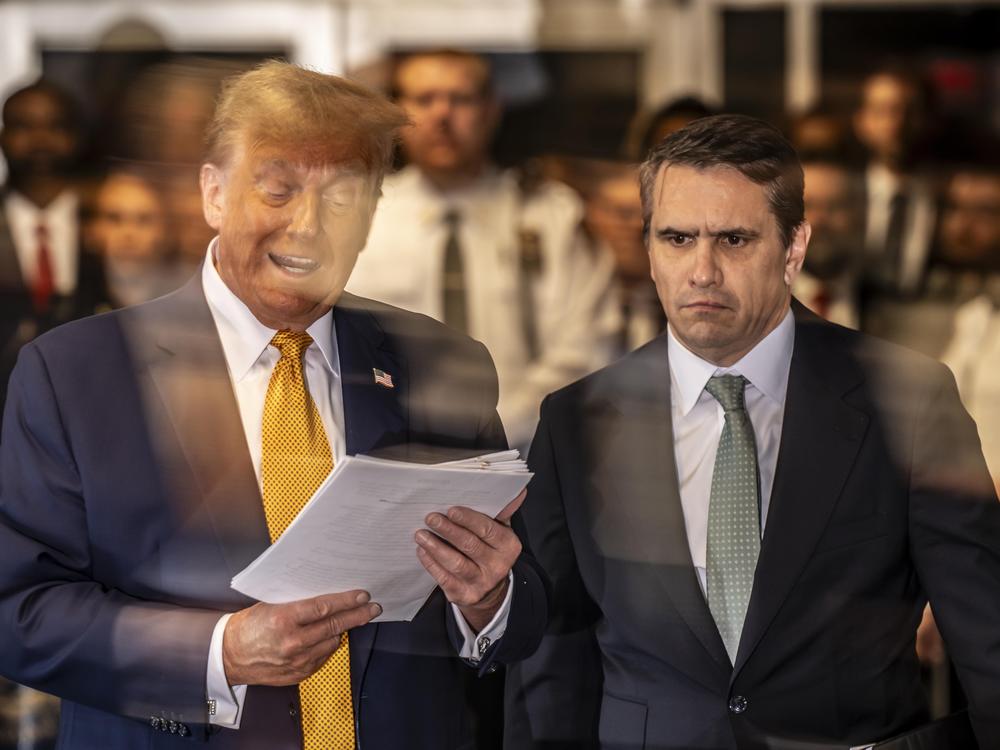Section Branding
Header Content
Trump was found guilty on all counts. What comes next?
Primary Content
After a trial that lasted 21 days and a deliberation that took less than ten hours, a Manhattan jury found former President Donald Trump guilty on all 34 criminal felony counts of falsifying business records.
Trump wasted no time in repeating his view that the trial had been "unfair" and "disgraceful" echoing earlier statements in which he called it a "witch hunt."
And he says he will appeal the charges.
But the historic decision of this jury will still have implications on the former president's life — some more immediate than others.
Trump is a Florida resident for example, and is registered to vote there.
You're reading the Consider This newsletter, which unpacks one major news story each day. Subscribe here to get it delivered to your inbox, and listen to more from the Consider This podcast.
Florida requires felons to complete their full sentence, whether that's parole or imprisonment, before they can vote.
No matter how things proceed, that's unlikely to happen in the next five months.
So while there isn't a law that prohibits people charged with felonies from running for president, Trump might not be able to cast a ballot for himself in the state of Florida.
The next steps in the process
That possible voting restriction is just one of many potential changes in Trump's life in the wake of this conviction.
He'll have to deal with sentencing, which will be doled out by presiding Judge Juan Merchan. That sentencing is scheduled at 10am on July 11.
And before that happens, there's a pre-sentencing interview, which will require a psychologist, social worker, or probation officer to interview the former president.
Then comes the pre-sentencing report, with input from the defense and recommendations for sentencing.
Judge Merchan could sentence Trump to probation, or up to four years on each criminal count with a maximum sentence of 20 years.
But a variety of legal experts are skeptical that Trump will actually serve any jail time.
A recent poll — and reporting from NPR senior politics correspondent Domenico Montanaro — shows that Trump's conviction might not do much to sway voters for the upcoming Presidential election either.
In speaking with Trump's most staunch base members, some of them share that they feel even more passionately about supporting his candidacy after the result of the trial.
The possibility of an appeal
Andrew Weissmann is an attorney and law professor at NYU, and was also a lead prosecutor in the Mueller investigation into Russian interference in the 2016 election.
Weissmann joined Consider This host Ari Shapiro to discuss what an appeal from the Trump team could look like, and how the next several weeks could play out.
"Everyone needs to understand that as much as Donald Trump has denigrated the criminal justice system, he had a fair trial. He had a jury, a judge, eminent defense counsel. And at this point, he will have a sentencing happening on July 11th. And at that point, he is entitled to appeal," Weissmann said.
"He can't appeal now. He has to first get sentenced. And the sentencing is going to be quick. The actual appeal process can take many, many months."
Weisssmann described that the civil fraud case where Trump was also unsuccessful had an expedited appeal, but still won't be heard until September.
He says there are several avenues that Trump's legal team could pursue for an appeal.
"He could raise an issue with respect to what's called the 'bump up.' That is what made this a felony as opposed to a misdemeanor. There were various theories that the state put forward and were submitted to the jury," Weissmann added.
The appeal, he explains, could be centered on those theories and whether or not they are valid.
"For instance, one was a federal election crime, whether it's if he had false business records with the intent to cover up or promote a federal election crime. Another theory was a state election crime. A third theory was state tax crime."
These theories that supported the prosecution's argument allow Trump's team to say that any or all of those are impermissible factors.
"I think in terms of the evidence, and the way in which the trial occurred, I don't see a lot of appellate issues. But that's what the appellate courts are for, is that a defense lawyer will make their best arguments. I think the legal one may be the strongest."
To get more insight on what Trump's next steps might look like, listen to the full episode of Consider This by clicking the play button at the top of the page.

